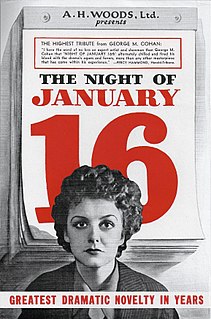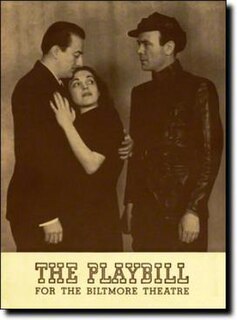
Alice O'Connor, better known by her pen name Ayn Rand, was a Russian-born American writer and philosopher. She is known for her fiction and for developing a philosophical system she named Objectivism. Born and educated in Russia, she moved to the United States in 1926. After two early novels that were initially unsuccessful and two Broadway plays, she achieved fame with her 1943 novel, The Fountainhead. In 1957, Rand published her best-known work, the novel Atlas Shrugged. Afterward, until her death in 1982, she turned to non-fiction to promote her philosophy, publishing her own periodicals and releasing several collections of essays.

Objectivism is a philosophical system developed by Russian-American writer Ayn Rand. Rand first expressed Objectivism in her fiction, most notably The Fountainhead (1943) and Atlas Shrugged (1957), and later in non-fiction essays and books. Leonard Peikoff, a professional philosopher and Rand's designated intellectual heir, later gave it a more formal structure. Rand described Objectivism as "the concept of man as a heroic being, with his own happiness as the moral purpose of his life, with productive achievement as his noblest activity, and reason as his only absolute". Peikoff characterizes Objectivism as a "closed system" insofar as its "fundamental principles" were set out by Rand and are not subject to change. However, he stated that "new implications, applications and integrations can always be discovered".

Anthem is a dystopian fiction novella by Russian-American writer Ayn Rand, written in 1937 and first published in 1938 in the United Kingdom. The story takes place at an unspecified future date when mankind has entered another Dark Age. Technological advancement is now carefully planned and the concept of individuality has been eliminated. A young man known as Equality 7-2521 rebels by doing secret scientific research. When his activity is discovered, he flees into the wilderness with the girl he loves. Together they plan to establish a new society based on rediscovered individualism.

Leonard Sylvan Peikoff is a Canadian-American philosopher. He is an Objectivist and was a close associate of Ayn Rand, who designated him heir to her estate after her death. He is a former professor of philosophy and host of a nationally syndicated radio talk show. He co-founded the Ayn Rand Institute (ARI) in 1985 and is the author of several books on philosophy.

We the Living is the debut novel of the Russian American novelist Ayn Rand. It is a story of life in post-revolutionary Russia and was Rand's first statement against communism. Rand observes in the foreword that We the Living was the closest she would ever come to writing an autobiography. Rand finished writing the novel in 1934, but it was rejected by several publishers before being released by Macmillan Publishing in 1936. It has since sold more than three million copies.

This is a bibliography for Ayn Rand and Objectivism. Objectivism is a philosophical system initially developed in the 20th century by Rand.

Introduction to Objectivist Epistemology is a book about epistemology by the philosopher Ayn Rand. Rand considered it her most important philosophical writing. First published in installments in Rand's journal, The Objectivist, July 1966 through February 1967, the work presents Rand's proposed solution to the historic problem of universals, describes how the theory can be extended to complex cases, and outlines how it applies to other issues in the theory of knowledge.

Night of January 16th is a theatrical play by Russian-American author Ayn Rand, inspired by the death of the "Match King", Ivar Kreuger. Set in a courtroom during a murder trial, an unusual feature of the play is that members of the audience are chosen to play the jury. The court hears the case of Karen Andre, a former secretary and lover of businessman Bjorn Faulkner, of whose murder she is accused. The play does not directly portray the events leading to Faulkner's death; instead the jury must rely on character testimony to decide whether Andre is guilty. The play's ending depends on the verdict. Rand's intention was to dramatize a conflict between individualism and conformity, with the jury's verdict revealing which viewpoint they preferred.

The Early Ayn Rand: A Selection from Her Unpublished Fiction is an anthology of unpublished early fiction written by the philosopher Ayn Rand, first published in 1984, two years after her death. The selections include short stories, plays, and excerpts of material cut from her novels We the Living and The Fountainhead.

Objectivism: The Philosophy of Ayn Rand is a 1991 book by the philosopher Leonard Peikoff, in which the author discusses the ideas of his mentor, Ayn Rand. Peikoff describes it as "the first comprehensive statement" of Rand's philosophy, Objectivism. The book is based on a series of lecture courses that Peikoff first gave in 1976 and that Rand publicly endorsed. Peikoff states that only Rand was qualified to write the definitive statement of her philosophic system, and that the book should be seen as an interpretation "by her best student and chosen heir." The book is volume six of the "Ayn Rand Library" series edited by Peikoff.

The Nathaniel Branden Institute (NBI), originally Nathaniel Branden Lectures, was an organization founded by Nathaniel Branden in 1958 to promote Ayn Rand's philosophy of Objectivism. The institute was responsible for many Objectivist lectures and presentations across the United States. Many of those associated with NBI worked on the Objectivist magazines, The Objectivist Newsletter and The Objectivist.

The Objectivist movement is a movement of individuals who seek to study and advance Objectivism, the philosophy expounded by novelist-philosopher Ayn Rand. The movement began informally in the 1950s and consisted of students who were brought together by their mutual interest in Rand's novel, The Fountainhead. The group, ironically named "the Collective" due to their actual advocacy of individualism, in part consisted of Leonard Peikoff, Nathaniel Branden, Barbara Branden, Alan Greenspan, and Allan Blumenthal. Nathaniel Branden, a young Canadian student who had been greatly inspired by The Fountainhead, became a close confidant and encouraged Rand to expand her philosophy into a formal movement. From this informal beginning in Rand's living room, the movement expanded into a collection of think tanks, academic organizations, and periodicals.

Ayn Rand, author and developer of Objectivism, held controversial views regarding homosexuality and gender roles. Although Rand personally viewed homosexuality negatively, considering it immoral and disgusting, she endorsed non-discrimination protection for homosexuals in the public sphere while opposing laws against discrimination in the private sector on the basis of individual rights.

The Art of Fiction: A Guide for Writers and Readers is a book about fiction writing by the philosopher Ayn Rand, published posthumously. Edited by Tore Boeckmann, it was published by Plume in 2000. The book is based on a 1958 series of lectures about fiction writing which Rand gave to a group of student readers and writers in her living room. A companion book is The Art of Nonfiction.

Atlas Shrugged is a 1957 novel by Ayn Rand. Her fourth and final novel, it was also her longest, and the one she considered to be her magnum opus in the realm of fiction writing. Atlas Shrugged includes elements of science fiction, mystery, and romance, and it contains Rand's most extensive statement of Objectivism in any of her works of fiction. Rand described the theme of Atlas Shrugged as "the role of man's mind in existence". The book explores a number of philosophical themes from which Rand would subsequently develop Objectivism, including reason, individualism, and capitalism, and depicts what Rand saw as the failures of governmental coercion.

Objectivist periodicals are a variety of academic journals, magazines, and newsletters with an editorial perspective explicitly based on Ayn Rand's philosophy of Objectivism. Several early Objectivist periodicals were edited by Rand. She later endorsed two periodicals edited by associates, and a number of others have been founded since her death.
Ayn Rand's Objectivism rejects an array of ideas and modes of living that it deems are primitive by nature and indicative of a primitive culture. Objectivism views primitive states of existence as being "savage" and marred in mysticism, fatalism, ignorance, superstition, poverty, passivity, and collectivism. The cure to such a society Objectivism holds is Western civilization, capitalism and modernity, which in its view brings with it reason, individualism, science, industrialization, and ultimately wealth.

The Ayn Rand Cult is a book by journalist Jeff Walker, published by Open Court Publishing Company in 1999. Walker discusses the history of the Objectivist movement started by novelist and philosopher Ayn Rand, which he describes as a cult.

Ideal is a posthumously published 2015 novel by Ayn Rand.

The Unconquered is a three-act play written by Russian-American author Ayn Rand as an adaptation of her 1936 novel We the Living. The story follows Kira Argounova, a young woman living in the Soviet Union in the 1920s. Her lover Leo Kovalensky develops tuberculosis. To get money for his treatment, Kira has an affair with a Communist official, Andrei Taganov. After recovering from his illness, Leo becomes involved with black market food sales that Andrei is investigating. When Andrei realizes that Kira loves Leo, he helps his rival avoid prosecution, then commits suicide. Leo leaves Kira, who decides to risk her life escaping the country.














